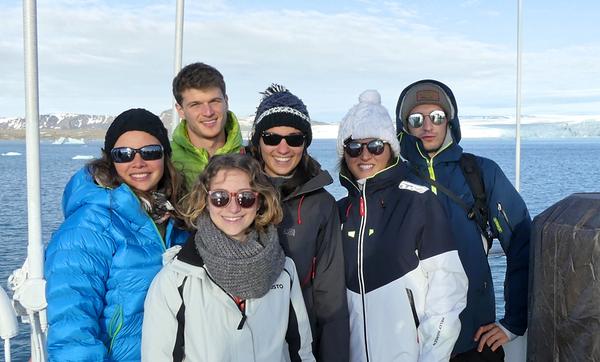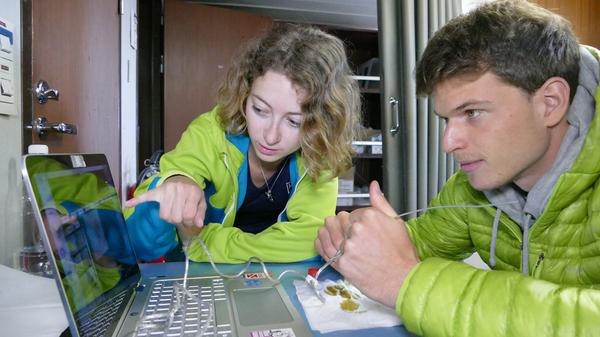Scientific adventure in the Arctic Ocean

Polar bear in the Franz Josef Archipelago. ©A.Pochelon
Twenty-three students from EPFL, the University of Lausanne and the University of Geneva recently spent three weeks in the Arctic Ocean, off the coast of Russia, studying the effects of climate change. This unique experience gave the students – some working on a ship, others at a research station – a unique opportunity to carry out important research.
“I’ve caught the bug! Now I’d like to go on other expeditions, in either the Arctic or the Antarctic,” says Jocelyn Roth. “After this amazing trip, I’m sure I want to work in oceanography,” adds Amélie Séchaud. Roth and Séchaud, both Master’s students at EPFL, joined around 20 other Swiss university students for an unforgettable summer that could prove to be a boon for their careers. They flew to northern Russia in July and then boarded a polar expedition ship, the Professor Molchanov, for three weeks of research in the Arctic Ocean, less than 1,000 kilometers from the North Pole.
The students – who came from EPFL, the University of Lausanne and the University of Geneva – were joined by Russian scientists in the “Arctic Floating University”. This research project was a joint initiative among the three Swiss schools as well as the Northern (Arctic) Federal University and the Geneva Global program.

Six EPFL students were on board the Professor Molchanov, from left to right: Solange Leblois, Jocelyn Roth, Amélie Séchaud, Mélanie Gaillet-Tournier, Alexia Rousseau, Eric Sauvageat. ©A. Rousseau
“The idea behind this expedition was to give students an international experience and an opportunity to learn more about this part of the world and its culture,” says Eric Hoesli, an EPFL professor and expert in Russia, and one of the expedition organizers. The main goal of the project was to study the effects of climate change in this particularly vulnerable part of the world. The students were divided into two groups: one was based at a research station on Samoylov Island in the Lena River delta, and the other worked on the ship.
Bringing together several disciplines
The EPFL students carried out the research as part of a Minor in Science, Technology and Area Studies (STAS) at the College of Humanities. It was the culmination of two semesters of courses on Russia and on the environmental challenges specific to the Arctic region. Whether on the ship or at the research station, the students performed their own research or took and analyzed samples for the Russian scientists. Every morning they also took classes spanning a wide range of disciplines such as geopolitics, international law, geography, social science, meteorology, oceanography, biology, geology, glaciology, ornithology and zoology.
“We learned a lot of different things, some more theoretical and some more practical, like how to use certain kinds of instruments,” says Séchaud, who is studying environmental engineering. “It was really interesting,” adds Roth, who is studying biotechnology and chemical engineering. “Not only did the classes give us a multi-faceted understanding of this region, but being able to talk with the different people on the project – the Russian scientists and students from other schools – was a great opportunity.”
The first polar albatross
The expedition also led to a number of scientific discoveries, especially in geology and ornithology. One student, while carrying out field observations, photographed an albatross – which could very well be the first of its species seen north of the Arctic Circle. Some soil samples taken by pedology researchers in Franz Josef Land seem to indicate a sharp increase in organic matter below the earth’s surface, which points to a change in soil type from polar desert to tundra. And the zoology experts saw a species of mosquito never before observed at those latitudes. Such findings, if confirmed, could be tangible signs of climate change in this part of the Arctic.
EPFL students looked specifically at CO2 transfer between the air and seawater. Roth and Séchaud were also involved in a research project that measured the mass of zooplankton between the city of Arkhangelsk and Franz Josef Land. “Physiochemical changes have a direct impact on the aquatic food chain. Zooplankton is second-lowest on the chain and therefore plays an important role. Any alteration in its amount or diversity could have ramifications along the entire chain,” says Roth.

Amélie Séchaud and Jocelyn Roth working on zooplancton data.
In light of the success of this expedition, a second one is planned for 2018 – providing another cohort of students a unique opportunity to perform research in this particularly remote part of the world.
This article was carried out in cooperation with with Garance Aymon, Jeremy Stanning and Luca Serafin, University of Geneva.























